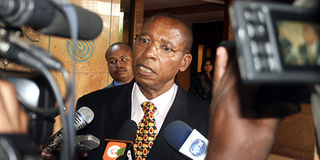Waki List suspects may face truth commission

Justice and Constitutional Affairs Minister Mutula Kilonzo. PHOTO/ CORRESPONDENT
What you need to know:
- Deal with ICC boss gives Kenya wriggle room in poll violence trials, says minister
Suspects of the crimes against humanity committed during the last General Election may be tried by a truth, justice and reconciliation commission or any other court set up by Parliament.
Such a court may have less powers than those of the special tribunal proposed by the commission on post-election violence chaired by Mr Justice Philip Waki.
Whatever judicial mechanism MPs agree to set up will, however, have to meet the standards set by the International Criminal Court (ICC).
This is part of the agreement reached between the Kenyan delegation and ICC prosecutor Luis Moreno-Ocampo last week.
Array of choices
This gives Kenya an array of choices, not confined to the special tribunal proposed by the Waki team or trials at The Hague.
Justice and Constitutional Affairs minister Mutula Kilonzo and the Prime Minister’s coalition advisor Miguna Miguna, giving details of the agreement, said there had been public confusion over the issue.
They said Mr Ocampo had made a concession to Kenya.
“Ocampo has never entered into any agreement with any other country like this,” Mr Kilonzo said by phone.
Mr Miguna said the kind of judicial mechanism envisaged in the agreement has not been tried anywhere else, but it has to be set up in accordance with international standards.
“There is no specific example of the judicial mechanism we agreed on because this has no precedence. But it has to be within the threshold of the Rome Statute,” he said when contacted.
Mr Kilonzo said the deal was in some ways similar to the agreement reached between the government of Uganda and Lords Resistance Army (LRA) of Joseph Kony, which sought to spare the rebels from facing The Hague.
The Kenyan delegation made up of Mr Kilonzo, Lands Minister James Orengo and Attorney-General Amos Wako signed the agreement with Mr Ocampo at his office on Friday. Mr Miguna accompanied the ministers.
The Ugandan agreement, which was spurred by arrest warrants issued against Kony and four of his top commanders by the ICC in 2006, and which remain in force, was to set up a special division of the High Court of Uganda to try individuals alleged to have committed serious crimes during the 22-year civil war.
The agreement was clear that prosecutions would focus on individuals alleged to have planned or carried out widespread, systematic or serious attacks against civilians, or who are alleged to have committed grave breaches of the Geneva Convention.
The prosecutions would run side by side with a traditional justice system to try perpetrators “of small” crimes during the war that has ravaged Northern Uganda since 1986 when President Yoweri Museveni came to power.
The accord also proposed the formation of a truth commission, while also granting some form of reparations for victims of the conflict.
But the agreement only existed on paper as the peace talks later collapsed, leading to renewed fighting. As such, the ICC warrants against Kony and his commanders remain in force.
However, Mr Miguna differed with the Justice minister saying the Kenyan deal was different from the Ugandan case.
“ It is not true that the agreements are similar. After all, there have been no prosecutions in Uganda,” he said.
The Kenyan delegation arrived back in the country on Saturday, but the full details of the agreement are only now becoming clear.
On Sunday, Mr Kilonzo and Mr Miguna said they promised to submit to the ICC a plan of how the country would bring to justice the politicians and businesspeople behind the post-election violence by the end of September.
Such a plan, they said, would either be in form of the special tribunal or a local judicial body agreed upon by Parliament.
“All we are required to do as a country by the end of September is to give the modalities, which could be in form of a special tribunal or a judicial mechanism adopted by Parliament,” the Justice minister said.
But should MPs reject the government plan to establish a judicial body to try the suspects by the end of the September, Mr Kilonzo said, they would hand over the case to The Hague.
Mr Miguna said that the judicial body provided for in the agreement with Mr Ocampo, demanded accountability and legitimacy, otherwise it would be rejected by the ICC.
Mr Kilonzo said the plan to deal with the masterminds of the violence could include a special court set up by the High Court as well as other methods such as the Truth, Justice and Reconciliation Commission; and the new Constitution.
“In 12 months’ time, we will have new institutions in place that will satisfy Ocampo. We are soon to establish the TJRC and we are sure of a new Constitution in 12 months, and Ocampo will be watching this closely,” he said.




